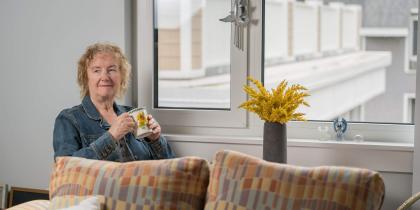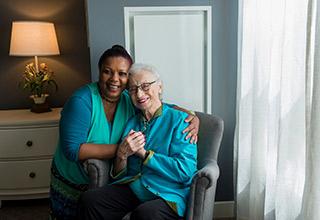Practical Self-Care for Caregivers: How to Make Your Well-Being a Priority
Tapping into available resources is essential to finding time to take care of yourself.

Taking care of yourself is essential. But if you’re a caregiver, you know that finding the time to prioritize your own needs can feel almost impossible.
Caring for yourself as a caregiver can feel like trying to replenish a bucket with holes. Even as you refill the bucket with water, it keeps draining out. But if you can replenish even a small amount of water, you can make an impact on your well-being.
Well-intentioned people may suggest taking long baths, cooking homemade meals, or picking up new hobbies as forms of self-care. While those can be rejuvenating, they are often unrealistic for caregivers.
So, let’s redefine the term self-care. Self-care is about taking moments to replenish yourself. It’s about forgiving yourself when you don’t respond perfectly to every stressful situation. It’s about leaning on resources outside of yourself to make these small moments of replenishment possible.
Recognizing caregiver stress and burnout
Caring for a loved one can be overwhelming and stressful. While stressful situations are inevitable, caregiver burnout is more serious. Burnout in caregivers of older adults with dementia can negatively impact both the quality of life of the caregiver and the care provided to their loved one.
If you’re experiencing burnout, you may feel like you’re at your breaking point or that you have nothing more to give. You may feel mentally and physically exhausted, or like there’s no end to the situation.
Identifying resources and asking for help is crucial to prevent and reduce burnout. Our blog post on the signs of caregiver stress and tips to avoid caregiver burnout goes into more detail about this topic.
Reframing how you talk to yourself
As a support group facilitator for caregivers at Orchard Cove in Canton, MA, I often begin by asking, “Who has acted in a way that you’re not as proud of as you’d like to be?” Nearly everyone can relate. Even if you know that being reactive doesn’t help the situation, caregivers are human. People are reactive sometimes. Forgiving yourself and acknowledging that you’re doing your best is vital.
Another topic that comes up is the concept of “putting a loved one” in an assisted living facility or nursing home as the next step for their care. You aren’t “putting them there.” You’re helping them get the care they need. Taking better care of yourself can mean recognizing the language you’re using to describe these care decisions. You don’t need to be so hard on yourself! You’re doing your best.
Letting go of control
Sometimes, caregivers feel like nobody else can care for their loved one. While you may know them best, that doesn’t mean you have to do it all. Having alternative caregivers can be beneficial to both you and your loved one. Even if someone else doesn’t care for them the exact same way you would, the most important thing is that your loved one is safe.
Whether enrolling your loved one into an adult day health program, hiring private care in the home, asking family members to pitch in, or reaching out to organizations with volunteers, remember that it doesn’t have to be just you. You can read about six resources to help caregivers connect to non-medical care and social support in another one of our blog posts.
Caregiver support groups can offer invaluable emotional support. Some local Councils on Aging offer support groups that allow both the caregiver and care recipient to attend groups at the same time, so you don’t have to worry about arranging care.
People often overlook long-term care insurance policies, believing that they’ll need them in the future. A lot of the time, I tell people that they’re already in the beginning of the long term. While I can’t speak to your situation, now may be a good time to use those funds if you have them. Most people do not exhaust their long-term care insurance, so keep it in mind as an option if cost has been a concern in accessing resources.
Finding a few moments of time
Get enough sleep. Eat a well-balanced diet. Exercise regularly. It’s all good advice — but advice you’ve probably heard before and already know is good for you. If you’re frustrated because you feel like there’s no time actually to implement those well-meaning tips, you aren’t alone.
So, how do you find the time to take care of yourself when you don’t feel like there is any? Start by aiming to let go of some control, as we talked about above. While that’s much easier said than done, doing it all alone makes it much harder to stay afloat.
Beyond that, seek out little moments of refuge to replenish your bucket. These moments don’t have to be an hour-long gym class or a gourmet home-cooked meal. Smaller acts of self-care can also be incredibly impactful.
If your loved one is engaged in something like watching TV or taking a nap, give yourself permission to rest instead of tackling another household chore. A five-minute break to listen to a favorite song or to just breathe can be helpful.
Going outdoors replenishes the soul. Step outside for a brief moment and breathe in the fresh air. Look around you and admire any flowers and foliage. Feel the wind or sunshine on your face, or listen to the sounds around you. Simply exist outside for a small moment.
Social isolation can be one of the hardest parts of caregiving. You may feel exhausted at the end of the day. However, a five-minute call with a friend can help. Think of it like an exercise class. You might not feel like you have the energy to do it, but you’ll feel grateful that you did afterward. Recognize that your family and friends know that your loved one is changing, whether that’s physically or cognitively; they will likely be okay spending time with them if they get time to catch up with you.
What can you do if caregiving demands more than you can give?
Aging in place is a common choice for many older adults, allowing them to remain in the comfort of their own homes. However, if regularly coordinating your loved one’s care is becoming increasingly overwhelming and is significantly impacting your quality of life, it may be time to explore other living options.
Hebrew SeniorLife offers senior living communities throughout Greater Boston that cater to older adults of all income levels and care needs. Whether your loved one requires long-term chronic care, assisted living, or independent living, we offer an option that can give you peace of mind. Depending on the community, our staff provides coordinated Harvard Medical School-affiliated health care right on-site, plus dining, fitness, socialization, programming, and more.
At the Deanna and Sidney Wolk Center for Memory Health, we offer caregiver and family support, including memory and dementia support groups and caregiver education. Those support groups are open to everyone, regardless of whether your loved one is in our care.
If you’re considering whether it’s time to make a change, we’re here to help. Contact us online today to discuss how we can best support your loved one’s well-being and care needs.
Join Our Community: Subscribe to the Hebrew SeniorLife blog for weekly insights on healthy aging and senior living.
Blog Topics
Learn More
Wolk Center for Memory Health
The Deanna and Sidney Wolk Center for Memory Health at Hebrew SeniorLife provides outpatient memory care services, in person and virtually, for people living with cognitive symptoms — and for their families and caregivers.





